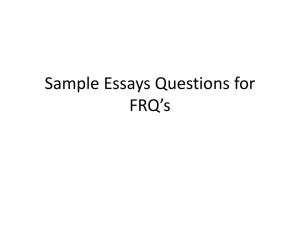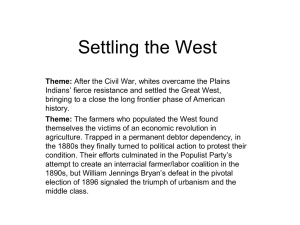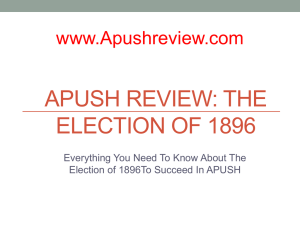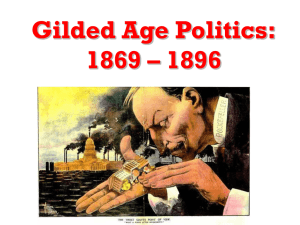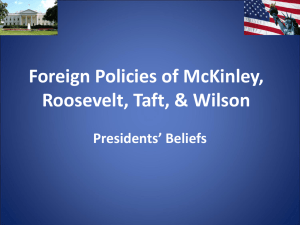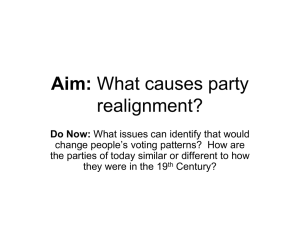Gilded Age Politics - Sarasota Military Academy
advertisement
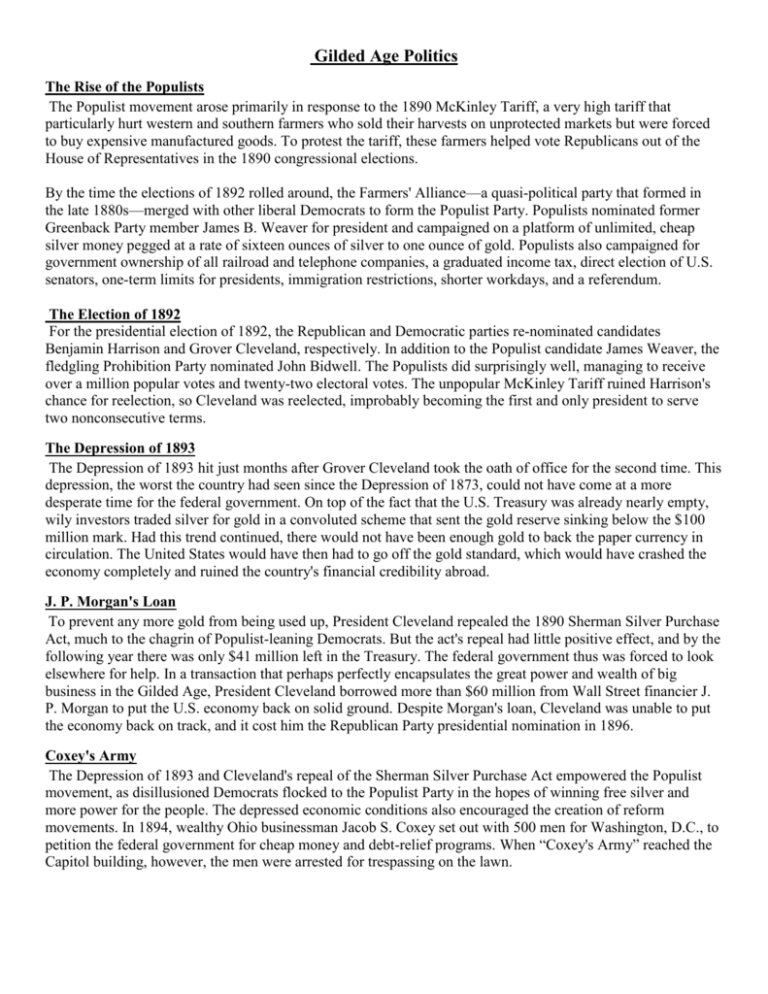
Gilded Age Politics The Rise of the Populists The Populist movement arose primarily in response to the 1890 McKinley Tariff, a very high tariff that particularly hurt western and southern farmers who sold their harvests on unprotected markets but were forced to buy expensive manufactured goods. To protest the tariff, these farmers helped vote Republicans out of the House of Representatives in the 1890 congressional elections. By the time the elections of 1892 rolled around, the Farmers' Alliance—a quasi-political party that formed in the late 1880s—merged with other liberal Democrats to form the Populist Party. Populists nominated former Greenback Party member James B. Weaver for president and campaigned on a platform of unlimited, cheap silver money pegged at a rate of sixteen ounces of silver to one ounce of gold. Populists also campaigned for government ownership of all railroad and telephone companies, a graduated income tax, direct election of U.S. senators, one-term limits for presidents, immigration restrictions, shorter workdays, and a referendum. The Election of 1892 For the presidential election of 1892, the Republican and Democratic parties re-nominated candidates Benjamin Harrison and Grover Cleveland, respectively. In addition to the Populist candidate James Weaver, the fledgling Prohibition Party nominated John Bidwell. The Populists did surprisingly well, managing to receive over a million popular votes and twenty-two electoral votes. The unpopular McKinley Tariff ruined Harrison's chance for reelection, so Cleveland was reelected, improbably becoming the first and only president to serve two nonconsecutive terms. The Depression of 1893 The Depression of 1893 hit just months after Grover Cleveland took the oath of office for the second time. This depression, the worst the country had seen since the Depression of 1873, could not have come at a more desperate time for the federal government. On top of the fact that the U.S. Treasury was already nearly empty, wily investors traded silver for gold in a convoluted scheme that sent the gold reserve sinking below the $100 million mark. Had this trend continued, there would not have been enough gold to back the paper currency in circulation. The United States would have then had to go off the gold standard, which would have crashed the economy completely and ruined the country's financial credibility abroad. J. P. Morgan's Loan To prevent any more gold from being used up, President Cleveland repealed the 1890 Sherman Silver Purchase Act, much to the chagrin of Populist-leaning Democrats. But the act's repeal had little positive effect, and by the following year there was only $41 million left in the Treasury. The federal government thus was forced to look elsewhere for help. In a transaction that perhaps perfectly encapsulates the great power and wealth of big business in the Gilded Age, President Cleveland borrowed more than $60 million from Wall Street financier J. P. Morgan to put the U.S. economy back on solid ground. Despite Morgan's loan, Cleveland was unable to put the economy back on track, and it cost him the Republican Party presidential nomination in 1896. Coxey's Army The Depression of 1893 and Cleveland's repeal of the Sherman Silver Purchase Act empowered the Populist movement, as disillusioned Democrats flocked to the Populist Party in the hopes of winning free silver and more power for the people. The depressed economic conditions also encouraged the creation of reform movements. In 1894, wealthy Ohio businessman Jacob S. Coxey set out with 500 men for Washington, D.C., to petition the federal government for cheap money and debt-relief programs. When “Coxey's Army” reached the Capitol building, however, the men were arrested for trespassing on the lawn. Cleveland's Second Term In 1892, Grover Cleveland defeated Republican incumbent Benjamin Harrison and Populist candidate James B. Weaver in 1892 to become the only U.S. president ever to serve two nonconsecutive terms. Although Cleveland's first four years were free of any major change, his second term was a tumultuous one. The Depression of 1893 hit the U.S. economy hard, forcing Cleveland to ask Wall Street mogul J. P. Morgan for a loan of more than $60 million. In 1894, more than 500 protesters in “Coxey's Army” marched on Washington demanding cheaper money and debt relief. Despite Morgan's loan, Cleveland was unable to put the economy back on track, and it cost him the Republican Party presidential nomination in 1896. The Election of 1896 By 1896 Grover Cleveland had virtually no chance of being elected for a third term. His presidency had been marred by a multitude of crises: he had failed to squelch the Depression of 1893, barely managed to keep the U.S. Treasury at a stable level, angered middle-class constituents by ending the Pullman Strike with federal forces, and not kept his promise to reduce the tariff significantly. As a result, Democrats instead nominated William Jennings Bryan, who at the nominating convention delivered his now-famous “Cross of Gold” speech in condemnation of the gold standard. In the speech, Bryan passionately proclaimed, “We will answer [the Republicans'] demands for a gold standard by saying to them: 'You shall not press down upon the brow of labor this crown of thorns; you shall not crucify mankind upon a cross of gold!'” Because the Democrats ran on a Populist-inspired platform, campaigning for free silver, the two parties joined in supporting Bryan. Meanwhile, Republicans nominated Senator William McKinley from Ohio, sponsor of the controversial McKinley Tariff, on a pro-business, anti–free silver platform. McKinley's campaign manager, Marcus “Mark” Hanna, worked behind the scenes to convince powerful business leaders to back several key Republican candidates. Hanna's expert politicking won McKinley the presidency despite Bryan's whirlwind speaking tour through the South and Midwest. Wealthy businessmen in the East invested about $15 million into McKinley's campaign, making it the largest campaign fund for a presidential candidate in history. Some Democrats quite reasonably claimed that McKinley had “bought” the White House. As a result, McKinley won the election of 1896, effectively killing free silver and the Populist movement. The Failure of Populism President McKinley ultimately killed the Populists' dream of free silver in 1900 when he signed the Gold Standard Act, stabilizing the value of the dollar to one ounce of gold. In 1897, McKinley also signed the Dingley Tariff to set overall tariff rates at approximately 45 percent. In retrospect, historians believe that the election of 1896 was one of the most important elections of the nineteenth century and certainly the most significant election since the Civil War. McKinley's win represented a victory for urban middle-class Americans over agrarian interests in the West and South. Populism never really spread into the cities, and Bryan's appeal for free silver and inflation alienated even the poorest Americans in the cities, who depended on a stable dollar to survive. The Bryan campaign of 1896 essentially marked the end of the Populist movement, for the Populist Party, by throwing its support behind the Democratic candidate William Bryan, effectively became a part of the Democratic Party. In addition, in light of Bryan's defeat, the election of 1896 marked the last time in which a major candidate tried to win by appealing to agricultural interests. McKinley's victory ushered in a new age in American politics in which conservatives dominated: Republicans would control the White House for the majority of the next thirty-six years. The Spanish-American War President William McKinley's greatest challenge as president was the growing tension between the United States and Spain over the island of Cuba. Spanish officials had suppressed an independence movement in Cuba, its most profitable Caribbean colony, and forced Cuban men, women, and children into internment camps. “Yellow journalists” like William Randolph Hearst and Joseph Pulitzer published sensational stories about the atrocities in Cuba, partly to increase their papers' circulation but also to provoke American ire for the Spanish. Although McKinley did not want go to war, he felt compelled to do so, especially after the mysterious explosion of the USS Maine in Havana Harbor, which was blamed on Spain. The war itself was over within a matter of weeks, but during that time, the United States seized the Philippines, Puerto Rico, and Cuba, thanks in part to future U.S. president Theodore Roosevelt and his Rough Riders. After the war, American forces withdrew from Cuba according to the Teller Amendment but also forced the new Cuban government to sign the Platt Amendment, giving the U.S. Navy a permanent military base at Guantánamo Bay, Cuba. The passage of the Foraker Act, meanwhile, granted Puerto Ricans limited government; they would not receive collective U.S. citizenship until 1917. Teddy Roosevelt's Big Stick Policy The election of 1900 turned out not to be much of a contest. Republicans re-nominated McKinley, who was popular because he had kept America prosperous and expanded the country as a result of the Spanish-American War. The Republicans also chose former Rough Rider Theodore Roosevelt to be McKinley's new running mate. Democrats again chose William Jennings Bryan on an anti-expansionism platform, but to their dismay, Bryan insisted once again on pushing for free silver—a stand that was partly responsible for his loss in the previous election. Roosevelt and Bryan traveled throughout the country and played to the crowds in two whirlwind campaigns. In the end, free silver did in fact kill Bryan's chances again, and McKinley won the election with almost a million more popular votes and twice as many electoral votes. However, only months into his second term, McKinley was assassinated by an anarchist while visiting the PanAmerican Exposition in Buffalo, New York. He died a week later, and Vice President Roosevelt was sworn in as president. Roosevelt took office as one of the youngest presidents in American history. Roosevelt saw the presidency as an opportunity to promote U.S. interests abroad, and adopted the slogan “Speak softly and carry a big stick.” One of his most important policies, the Roosevelt Corollary to the Monroe Doctrine, declared that only the United States, not Old World powers, had the authority to interfere with Latin American affairs. Roosevelt's secretary of state, John Hay, drafted the Open Door Notes, which asked that Japan and the European powers respect China's territorial status and allow China to trade with every nation – counteracting the “spheres of influence” European nations had created in China (which had cut off the U.S.’s ability to trade with China). Roosevelt went on to take over Colombia's northernmost province, Panama, in order to secure America the right to build the Panama Canal. Toward the end of his presidency, Roosevelt also sent the Great White Fleet, a group of U.S. Navy battleships, around the world in a symbolic display of force. Roosevelt and Progressivism Roosevelt was just as active at home as he was abroad. Roosevelt viewed his presidency as a “bully pulpit” from which he could urge the nation to do the right thing and follow his example (outdoor living, conservation of natural resources, athletic prowess). During his presidency, America became increasingly urbanized and industrialized. The Progressive movement, which formed as a response to the rapid social and economic growth and change that was taking place, helped spawn a new era of social reform. Muckrakers—journalists who wrote about political and industrial corruption as well as social hardships—had significant influence on Roosevelt, who outlined a package of domestic reforms called the Square Deal, which were meant to protect consumers, tame big business, support the labor movement, and conserve the nation's natural resources. Congress, meanwhile, passed the Elkins Act and Hepburn Act to regulate the railroads and the Pure Food and Drug Act and Meat Inspection Act to regulate food inspection and sanitation. Congress passed the acts, in part, after the popularity of Upton Sinclair's novel The Jungle, which exposed unsanitary meatpacking practices. Roosevelt also supported strikers in the Anthracite Strike, prosecuted several trusts under the Sherman AntiTrust Act, and signed the 1902 Newlands Act, selling lands in the West to fund irrigation projects. Taft's Presidency Roosevelt's friend and handpicked successor William Howard Taft promised to carry out the rest of Roosevelt's progressive policies if he were elected president. After winning the election of 1908, however, Taft proved to be more of a traditional conservative than most had expected. Although he continued progressive policy by prosecuting more trusts than his predecessor (though ironically it is Teddy Roosevelt who is known as the “trust-buster” president), in a more conservative vein than Roosevelt he signed the steep Payne-Aldrich Tariff in 1909 and fired conservationist Gifford Pinchot from the forestry division. Many Republican Progressives, including his former friend Roosevelt, denounced Taft as a traitor to the movement. When Republicans nominated Taft again in 1912, Roosevelt left the convention and entered the presidential race as the candidate for the new Progressive Republican or Bull Moose Party. Wilson’s First Term With two feuding party leaders splitting the Republican vote, Democrat Woodrow Wilson managed to win the presidential election. Also a Progressive, Wilson championed a new group of reforms, the New Freedom, which regulated big business, further supported the labor movement, and reduced tariffs. In 1913, he signed the Underwood Tariff, which was lower than Taft's, and also reformed the national banking system with the Federal Reserve Act. The following year, Wilson passed the Clayton Anti-Trust Act to replace the much weaker Sherman Act of 1890, which was riddled with loopholes. Other progressive bills he signed into law included the Warehouse Act, the La Follette Seaman's Act, the Workingman's Compensation Act, and the Adamson Act. Wilson also ordered General John “Blackjack” Pershing to invade Mexico in 1916 to pursue the bandit Pancho Villa. 1876 Rutherford B. Hayes is elected president in the Compromise of 1877 1877 Railroad workers strike across United States 1880 James A. Garfield is elected president 1881 Garfield is assassinated; Chester A. Arthur becomes president – Arthur institutes reforms in the Civil Service 1883 Congress passes Pendleton Act 1884 Grover Cleveland is elected president 1888 Benjamin Harrison is elected president 1890 Congress passes Sherman Silver Purchase Act, Pension Act, and McKinley Tariff Rutherford B. Hayes - 19th U.S. president; technically lost election but took office after Compromise of 1877 with southern Democrats (Hayes agreed to pull the last federal troops out of the South in return for the South’s votes). Rutherford B. Hayes had little political power during his four years in office, having barely squeaked into the White House by one vote after the Compromise of 1877, in which the Democrats ceded the White House to the Republicans in exchange for an end to Reconstruction in the South. The real winners in the election were Republican spoils seekers who flooded Washington, D.C., in search of civil service jobs. James A. Garfield - 20th U.S. president; elected in 1880 but assassinated after less than a year in office Chester A. Arthur - 21st U.S. president; took office in 1881 after Garfield's assassination James G. Blaine - Congressman from Maine; leader of Half-Breeds in the Republican Party Grover Cleveland - 22nd and 24th U.S. president; first elected in 1884 after defeating James G. Blaine Roscoe Conkling - New York senator; leader of the Stalwarts in the Republican Party Benjamin Harrison - 23rd U.S. president and grandson of ninth U.S. president, William Henry Harrison; defeated incumbent Grover Cleveland in 1888 William “Boss” Tweed - Corrupt Democrat who controlled most of New York City politics during the Gilded Age (the corrupt political machine of the Democratic party was known as TAMMANY HALL) Stalwarts and Half-Breeds Disputes over these spoils split the Republican Party into two factions: the Stalwarts, led by Senator Roscoe Conkling of New York, and the Half-Breeds, led by Congressman James G. Blaine of Maine. Neither group trusted the other, and the split left the Republican Party unable to pass any significant legislation during this time. The Railroad Strike of 1877 The only major upheaval during Hayes's presidency was the Great Railroad Strike of 1877, when railroad workers throughout the United States went on strike to protest the lowering of their salaries. More than a hundred people died during violence related to the strike, forcing Hayes to use federal troops to suppress the uprisings. The Election of 1880 By the election of 1880, the Republicans, no longer supporting Rutherford B. Hayes, nominated the relatively unknown Ohioan James A. Garfield for president, along with the Stalwart running mate Chester A. Arthur. Democrats nominated Civil War veteran Winfield Scott Hancock, and the pro-labor Greenback Party nominated James B. Weaver. In the election, Garfield received a sizable majority of electoral votes but won the popular vote by only a slim margin over Hancock. Garfield and Hayes Like Hayes's, Garfield's presidency was overshadowed by Stalwart and Half-Breed infighting. In the summer of 1881, Garfield's term was cut short when a delusional Stalwart supporter named Charles Guiteau assassinated Garfield in Washington, D.C. Guiteau hoped that Vice President Arthur would become president and give more federal jobs to Stalwarts. Although Chester A. Arthur did replace Garfield, the assassination convinced policymakers that the U.S. government was in dire need of civil service reform to combat the spoils system. Congress therefore passed the Pendleton Act in 1883, which created the Civil Service Commission to ensure that hiring of federal employees was based on examinations and merit rather than political patronage. The Election of 1884 The election of 1884 was one of the most contentious in U.S. history. The spoils system remained the central issue of the political contest, and candidates debated about what it would take to reform civil service. Republicans nominated Half-Breed James Blaine of Maine, while Democrats nominated Governor Grover Cleveland of New York. The Democratic Party accused Blaine of conspiring with wealthy plutocrats to win the White House, while Republicans attacked Cleveland for having an illegitimate son. In the end, Cleveland barely defeated Blaine, by a margin of only forty electoral votes and a paltry 30,000 popular votes. Cleveland and Harrison President Cleveland's first four years were fairly uneventful; his only major action was his proposal of a lower tariff to reduce the Treasury surplus near the end of his term. When the election of 1888 rolled around, Republicans rallied big business in the North and nominated Benjamin Harrison, a grandson of ninth U.S. president William Henry Harrison. Republicans were afraid that Democrats would succeed in lowering the protective tariff, so Harrison campaigned for an even higher tariff. Democrats countered by re-nominating Grover Cleveland. The results of the election were just as close as the other presidential elections of the Gilded Age, and Harrison ended up victorious. During Harrison's term, the Republican-majority Congress passed several notable bills, including the Sherman Silver Purchase Act, which allowed the government to buy more silver to produce currency; the Pension Act, which distributed more money to Civil War veterans; and the controversial McKinley Tariff, which increased duties on foreign goods to about 50 percent.

